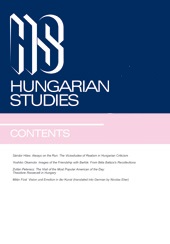Politics and literature: A case study. Kosztolányi’s reception during the communism
Politics and literature: A case study. Kosztolányi’s reception during the communism
Author(s): Zsuzsanna AranySubject(s): Aesthetics, Political Philosophy, Hungarian Literature, Marxism, History of Communism
Published by: Akadémiai Kiadó
Keywords: commune; Dezsõ Kosztolányi; György Lukács; literary canon; Hungarian literature; art for art’s sake; literature; politics; Marxism; reception history;
Summary/Abstract: As a contribution to a larger theoretical discussion of the relationships between literature and political context, this paper offers an examination of the reception of the works of Hungarian poet and novelist Dezsõ Kosztolányi during the communist period, drawing particular emphasis to the origins of several misunderstandings. Over the past several decades Hungarian Marxist literary theorists, influenced by the philosophical and aesthetical heritage of György Lukács, have thought of artists as having a revolutionary role in society and literature as having an important role as a means through which to educate the nation. Kosztolányi’s concept of art for art’s sake did not minister to this ideological and political system, and as a consequence his reception and reputation suffered. Not only were critical evaluations of his writings, both literary and theoretical, distorted and crafted with the intention of creating a misleading image of the author, but the editions of his texts were also censored. It is not mere accident or circumstance that the critical edition series of his works could not be edited and research groups and projects dealing with an edition of his life’s work were not financed under the communist regime. Hungarian intellectuals have yet to raise the question as to why open discussion of the beginning of the 20th century (when events took place that continue to exert an influence on conceptions of culture today) remains a taboo. Why are there no (or few) critical editions and anthologies or studies dealing with the period? Twenty years have passed since the political transition and the situation remains essentially the same. Hungarian philologists who deal with Kosztolányi’s oeuvre must address these questions and challenge the Marxist axioms and stereotypes if they hope to further the development of Kosztolányi’s reception. Relying on postmodern theories is not sufficient if there is little fundamental research.
- Issue Year: 23/2009
- Issue No: 1
- Page Range: 59-76
- Page Count: 18
- Language: English
- Content File-PDF

